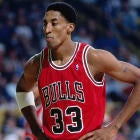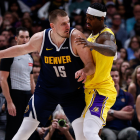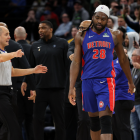"The Last Dance" has come and gone, and while Michael Jordan came out of the documentary itself smelling like roses, some of his former teammates aren't exactly thrilled with how they were portrayed. Among them is Jordan's greatest teammate, Scottie Pippen, who is reportedly "beyond livid" over the way he was treated in the documentary, according to ESPN 1000's David Kaplan.
"He is so angry at Michael and how he was portrayed, called selfish, called this, called that, that he's furious that he participated and did not realize what he was getting himself into," Kaplan said.
Jordan called Pippen selfish in the second episode of the series for his decision to have surgery at the beginning of the 1997-98 season rather than the offseason, a decision he admitted in the documentary was motivated by the desire to protect his value with free agency looming in the summer of 1998 and bitterness over the poor contract he signed in 1991. According to Kaplan, that wasn't his only gripe.
"He felt like up until the last few minutes of Game 6 against the Jazz, it was just 'bash Scottie, bash Scottie, bash Scottie,'" Kaplan said.
The documentary features several other less-than-flattering stories about Pippen. It spends a fair bit of time detailing his decision not to re-enter Game 3 of Chicago's 1994 second-round series against the New York Knicks for the final 1.8 seconds because Toni Kukoc was given the final shot over him. It also mentions the migraine he suffered in Game 7 of the 1990 Eastern Conference Finals against the Detroit Pistons, and at one point, Bill Wennington said that Pippen "crossed the line" in his treatment of general manager Jerry Krause. While Jordan does acknowledge Pippen as his best teammate, the documentary at large chronicles many of his worst moments.
Kaplan's reporting corroborates a story that Jackie McMullan wrote for ESPN earlier in May, in which she reported that "those close to him say he's wounded and disappointed by his portrayal." He is not the only Bull to feel slighted by the series. Horace Grant told ESPN's Nick Friedell that most of the documentary was false.
"I would say [it was] entertaining, but we know, who was there as teammates, that about 90% of it -- I don't know if I can say it on air, but B.S. in terms of the realness of it," Grant said. "It wasn't real, because a lot of things [Jordan] said to some of his teammates, that his teammates went back at him. But all of that was kind of edited out of the documentary, if you want to call it a documentary."
Grant went off on Jordan on a number of topics, but took specific offense to Jordan's claim that he had been a source for Sam Smith's groundbreaking 1992 book, "The Jordan Rules," arguing that Jordan should look in the mirror based on claims that he made in the documentary.
"And my point is, he said that I was the snitch, but yet and still after 35 years he brings up his rookie year going into one of his teammates' rooms and seeing coke and weed and women. My point is: Why the hell did he want to bring that up? What's that got to do with anything? I mean, if you want to call somebody a snitch, that's a damn snitch right there."
Another former teammate, Craig Hodges, has made similar points, and others reportedly have similar feelings. Jordan's participation in the documentary was necessary for its production in the first place, and that naturally meant that he had quite a bit of control over the way that he was portrayed. The irony in that is that even though the documentary leans towards his perspective on these events, it upset so many of his teammates that the series' aftermath may do more damage to his reputation than the documentary itself.
![[object Object] Logo](https://sportshub.cbsistatic.com/i/2020/04/22/e9ceb731-8b3f-4c60-98fe-090ab66a2997/screen-shot-2020-04-22-at-11-04-56-am.png)


















